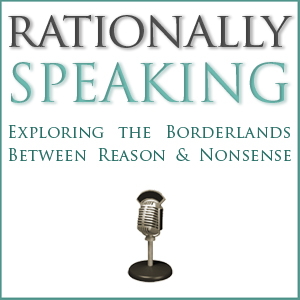Rationally Speaking #63 - Consilience: The Unity of Knowledge
Rationally Speaking Podcast
New York City Skeptics
4.6 • 787 Ratings
🗓️ 17 June 2012
⏱️ 49 minutes
🧾️ Download transcript
Summary
Transcript
Click on a timestamp to play from that location
| 0:00.0 | Rationally speaking is a presentation of New York City skeptics dedicated to promoting critical thinking, skeptical inquiry, and science education. |
| 0:22.4 | For more information, please visit us at NYC Skeptics.org. |
| 0:35.4 | Welcome to Rationally Speaking, the podcast where we explored the borderlands between reason and nonsense. |
| 0:40.8 | I'm your host, Massimo Pilucci, and with me as always is my co-host, Julia Galev. |
| 0:45.4 | Julia, what are we going to talk about today? |
| 0:48.1 | Massimo, our topic today has a technical, dry-sounding name and then a very exciting sounding name. |
| 0:53.7 | So the official name of the topic |
| 0:55.4 | we're discussing is conciliants. And the exciting subtitle, which I like more, is the unity of knowledge, |
| 1:02.6 | which sounds potentially promising but also vague. So we're going to explain what it is. It was, |
| 1:09.1 | I think the term was, like the modern version of what's meant by the term was |
| 1:14.6 | originated by a book about 15 years ago by E.O. Wilson. And it essentially, although we'll |
| 1:21.8 | expand on this definition, means the unifying of different fields or of different ways of explaining the world. |
| 1:29.3 | And his thesis in the book was that we are over time approaching a unified explanation of how the world works, |
| 1:36.3 | such that the divisions between different fields of science and even between science and the humanities |
| 1:41.3 | are just sort of temporary as we're in the process of figuring things out. |
| 1:45.1 | But those boundaries will eventually blur and then fade away. |
| 1:49.0 | Right. |
| 1:49.6 | Yeah, that's the basic idea. |
| 1:51.1 | And the reason we're talking about it, even though Wilson, as you said, published a book back in 1998, |
| 1:57.5 | well, it's twofold. |
| 1:59.2 | For one thing, it is, in in fact a by now a classic. |
| 2:03.3 | I mean, a lot of people know about that book and a lot of people refer to it even though they might not have read it since it came out. |
... |
Please login to see the full transcript.
Disclaimer: The podcast and artwork embedded on this page are from New York City Skeptics, and are the property of its owner and not affiliated with or endorsed by Tapesearch.
Generated transcripts are the property of New York City Skeptics and are distributed freely under the Fair Use doctrine. Transcripts generated by Tapesearch are not guaranteed to be accurate.
Copyright © Tapesearch 2025.

